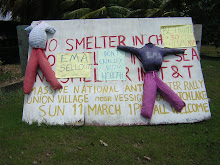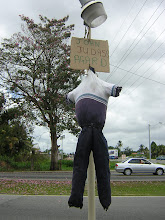Rent from the oil/gas economy and billions of foreign investment in the 'heavy gas' based industrial sector provide the illusion of near full employment and wealth. But these revenues are near spent. It is costing T&T over one-hundred milion $US to host this Summit. The decision to do so was made before the collapse of global capitalism.
EVIDENCE OF ENERGY INSECURITY
No Vision, Goal, Policy or Planning documents of the Government of T&T, contain any reference to 'Energy Security' in terms of sustainability planning for the future. The only 'security' refrences are to protection of supply infrastructure from natural disasters and terrorism so that we can continue to feed the insatiable demand of USA and others.
When presenting her Letter of Credence to US Government (06/June/08) the T&T Ambassador to the USA stated "the United States also responded swiftly to the request from Trinidad and Tobago to assist in our country’s energy security initiatives through an assessment of the critical infrastructure of our energy sector, a sector which has provided, on average, some 68% of the liquefied natural gas requirements of the United States in the last six years and approximately 69% and 51% respectively of ammonia and methanol."
The Government of Trinidad & Tobago's ENERGY POLICY is best described as a "GAS RUSH".
In the local Guardian Newspaper (04/March/08) Reginald Potter, Gas Expert and Geologist, under the heading "Explain Maths on Gas Reserves" points out: "Gas contracts are based on proven reserves. Present consumption is 4.0 billion cubic feet a day or 1.46 trillion cubic feet a year. A new project will require 20-30 years of assured gas supply. If existing industries similarly demand 20 years of assured (contracted) supply we need at least 29 trillion cubic feet of proven reserves to provide that assurance for them alone.
Our proven reserves are 16.74 trillion cubic feet, or rather they were in January 2006, the effective date of the Ryder Scott report. But we have had two years of no discoveries since then so it’s probably 13 or 14 trillion as of January this year.
Furthermore, the Minister of Energy let slip in one of his speeches that the inaccessible gas shared with Venezuela is included for the first time in this audit, so taking that out there are probably 11 trillion cubic feet left. That means present proven reserves amount to about 7.5 years consumption (reserves to production ratio or R/P).
How then can the Government be pressing ahead with Essar Steel, Alutrint, AUM complex, a propylene plant, and talking to BG (about LNG “Train X?”). If these are allowed to see the light of day, our R/P ratio drops to probably five years.
Incidentally, the Ryder Scott audit is not new. It is the responsibilty of Government to do this every year but it managed to let it lapse in the hope that BP’s “Deep Ibis” well would prove some hitherto unknown vast potential for exploration. That failed.
The Ryder Scott report can be accessed online for every preceeding year and shows clearly that the reserves have always been in short supply while Government allowed new projects to take us to the present four billion cubic feet a day. The much touted “new” audit to be done is merely a continuation of the practice that has fallen two years in arrears. Audits are not a procedure for discovering gas."
Grave Concerns for Natural Gas Reserves were also expressed (18/October/06) by Kasala Kamara (political scientist, lecturer, educator, author, journalist and consultant): "While the large majority of people of Trinidad and Tobago are of the view that the country's natural gas reserves have a life span of over twenty (20) years, experts in the energy sector have been expressing grave concern not only about the adequacy of natural gas to service the heavy industrial projects planned but also how the gas is being used or exploited"..."
"...In a front page article entitled, Gas Reserves: does Trinidad Really Have Enough Gas for all its Projects? Energy Caribbean issue number 22 reported: "Is a gas shortage looming in Trinidad and Tobago that could have the effect of temporarily halting petrochemical development in particular and further possible expansion into liquefied natural gas?"Many informed analysts think this is certainly the case and the ministry of energy may be keeping the matter low-key, in order to avoid drawing too much attention to it..."
"...The National Gas Company does not of its own have significant amounts of natural gas nor does state-owned PETROTRIN. In other words, our natural gas essentially remains under the ownership and control of foreign transnational corporations whose primary goal is to extract as much as possible and fetch the best market price to facilitate achieving the goal of profit maximisation and business growth and expansion. Our long-term growth and development is not a priority."
Despite these concerns, in his 2008 Budget Speach to Parliament, Prime Minister Patrick Manning expanded the 'GAS RUSH' stating... "there are also five gas-based projects which are due to come on stream in the short term. They are:
• the Essar Steel Complex which involves the establishment of an integrated steel complex producing flat hot rolled coil as well as hot briquette iron and slabs;
• Methanol/Propylene/Polypropylene (MTP) - Discussions on Project details between Lurgi and the Government are ongoing. Basell, a joint venture between BASF and Shell is proposing a 160,000 tonne per annum plant at a capital cost of TT$9.5 billion;
• the Methanol Holdings’ AUM Complex with a proposed capacity of the plant is 1.5 million tonnes per annum of Urea Ammonium Nitrate and 60,000 tonnes per annum of Melamine: the capital cost is TT$10.1 billion;• World GTL Trinidad Limited (WGTL-TL) Gas-to-Liquid plant which is a joint venture between World GTL Inc. (New York) and the Petroleum Company of Trinidad and Tobago Ltd. (Petrotrin). World GTL-Trinidad Limited will own and operate the 2,250 bpd Gas to Liquids (GTL) plant; and
• the Alutrint Smelter Complex: the capital cost is TT$1.65 billion and will produce 125,000 metric tonne per annum, all of which will be used for downstream industries.
Manning continued..."Mr. Speaker, in 2005 the Government received proposals to construct two Aluminium smelters, one by Alcoa and the other by Alutrint. An Agreement in Principle was prepared by Alcoa in November 2005, to conduct feasibility studies to explore the establishment of an Aluminium facility at Chatham/Cap De Ville. A decision in principle to relocate the proposed site of the Plant has delayed this project."
END


















































ilike this.. good work kep it up.
ReplyDeleteTHERE MUST BE A BETTER WAY!!!
Reading this makes me angry...but deflated as well...as if I have no power against these people whose selfish agendas seek to destroy our country. I wrote to Green Peace once, but someone told me to write to the representative of the Smelter area and come up with a petition and submit it. Can you all do it? Having Green Peace here would make such a Global Environment statement, we may just get the attention we need to stop this madman in his tracks.
ReplyDelete